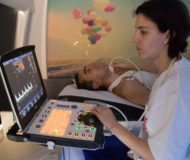

According to a new study conducted on participants in the El Bus de la Salut (ILERVAS) project cohort, adherence to the Mediterranean diet could play a key role in preventing subclinical atherosclerotic disease, a condition that develops silently before leading to serious cardiovascular diseases. The research, led by investigators from CERCA centers, the Sant Pau Research Institute, and the Biomedical Research Institute of Lleida (IRBLleida), has been published in the journal *Nutrients*.
The study, which included 3,097 participants, demonstrated that a healthy Mediterranean diet, rich in nuts, vegetables, fish, and olive oil, was associated with a significant reduction in atherosclerotic plaques in the arteries. Specifically, researchers observed a 3% decrease in the number of territories affected by plaques in participants with higher adherence to the Mediterranean dietary pattern, as assessed by the MEDAS (Mediterranean Diet Adherence Screener) scale.
“We designed a healthy lifestyle index based on the Mediterranean diet and physical exercise to evaluate its relationship with the progression of atherosclerotic plaques. Although the overall score did not show an association with progression, when analyzing the components separately, we found that exercise did not offer significant protection, while adherence to the Mediterranean diet was indeed associated with less progression of atherosclerotic plaques,” explained Marina Rojo, a researcher in the Endocrinology, Diabetes, and Nutrition group at IR-Sant Pau.
“This research highlights the cardiovascular benefits of the Mediterranean diet, demonstrating that it not only helps prevent disease but also reduces the progression of atherosclerosis, one of the main risk factors for heart disease,” commented Marcelino Bermúdez, professor at the University of Lleida and researcher in the vascular and renal translational research group at IRBLleida. “These findings underscore that promoting adherence to the Mediterranean diet, along with managing traditional risk factors such as hypertension and smoking, could be an effective public health intervention to prevent atherosclerosis and reduce the burden of cardiovascular diseases on society,” added the researcher.
Although physical activity did not show a significant association with the progression of atherosclerotic disease in this study, the results suggest that the Mediterranean diet might play a more prominent role in protecting against atherosclerosis. This finding reinforces the importance of healthy eating as a fundamental part of an integrated cardiovascular prevention strategy.
The study also identified other risk factors for the future development of fatty plaques in the arteries, such as advanced age, hypertension, smoking, and dyslipidemia. Additionally, the researchers found that being female might have a protective effect against the progression of the disease.
This research was funded by the CIBER-Consortium for Research in Biomedicine in Network-(CB15/00071) of the Carlos III Health Institute, the Ministry of Science, Innovation and Universities, the Strategic Health Research and Innovation Plan (PERIS) 2021–2024 of the Generalitat of Catalonia, the State Research Agency, the European Union “NextGeneration EU,” the Agency for the Management of University and Research Grants, the Lleida Provincial Council, the European Regional Development Fund “A Way to Make Europe,” the Biomedical Research Networking Center in the area of Biomedical Engineering, Biomaterials and Nanomedicine (CIBER-BBN), and the CERCA Program/Generalitat of Catalonia.
Reference Article:
Rojo-López MI, Bermúdez-López M, Castro E, Farràs C, Torres G, Pamplona R, Lecube A, Valdivieso JM, Fernández E, Julve J, et al. *Mediterranean Diet Is a Predictor of Progression of Subclinical Atherosclerosis in a Mediterranean Population: The ILERVAS Prospective Cohort Study.* Nutrients. 2024; 16(21):3607. [https://doi.org/10.3390/nu16213607](https://doi.org/10.3390/nu16213607)